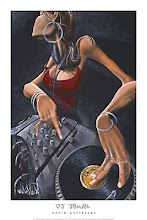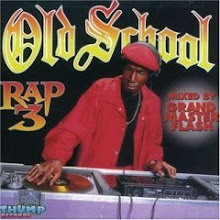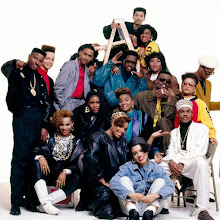
Run-D.M.C. was a pioneering hip hop group during the 1980's founded by Joseph "Run" Simmons, Darryl "D.M.C." McDaniels, and Jason "Jam-Master Jay" Mizell. The group had an impact on the development of hip hop through the 1980's and is credited with breaking hip hop into mainstream music. In 2004, Rolling Stone ranked them number 48 in their list of the greatest ever musical artists of all time.
More than any other hip-hop group, Run-D.M.C. are reponsible for the sound and style of the music. As the first hardcore rap outfit, the trio set the sound and style for the next decade of rap. With their spare beats and excursions into heavy metal samples, the trio were tougher and more menacing than their predecessors (Sugar Hill Gang, Grandmaster Flash, etc.). In the process, they opened the door for both the politicized rap of Public Enemy and Boogie Down Productions, as well as the hedonistic gangsta fantasies of N.W.A. At the same time, Run-D.M.C. helped move rap from a singles-oriented genre to an album-oriented one -- they were the first hip-hop artist to construct full-fledged albums, not just collections with two singles and a bunch of filler. By the end of the '80s, Run-D.M.C. had been overtaken by the groups they had spawned, but they continued to perform to a dedicated following well into the '90s.
All three members of Run-D.M.C. were natives of the middle-class New York borough Hollis, Queens. Run (born Joseph Simmons, November 14, 1964) was the brother of Russell Simmons, who formed the hip-hop management company Rush Productions in the early '80s; by the mid-'80s, Russell had formed the pioneering record label Def Jam with Rick Rubin. Russell encouraged his brother Joey and his friend Darryl McDaniels (born May 31, 1964) to form a rap duo. The pair of friends did just that, adopting the names Run and D.M.C., respectively. After they graduated from high school in 1982, the pair enlisted their friend Jason Mizell (born January 21, 1965) to scratch turntables; Mizell adopted the stage name Jam Master Jay.
In 1983, Run-D.M.C. released their first single, "It's Like That"/"Sucker M.C.'s," on Profile Records. The single sounded like no other rap at the time -- it was spare, blunt, and skillful, with hard beats and powerful, literate, daring vocals, where Run and D.M.C.'s vocals overlapped, as they finished each other's lines. It was the first "new school" hip-hop recording. "It's Like That" became a Top 20 R&B hit, as did the group's second single, "Hard Times"/"Jam Master Jay." Two other hit R&B singles followed in early 1984 -- "Rock Box" and "30 Days" -- before the group's eponymous debut appeared.
By the time of their second album, 1985's King of Rock, Run-D.M.C. had become the most popular and influential rappers in America, already spawning a number of imitators. As the King of Rock title suggests, the group were breaking down the barriers between rock & roll and rap, rapping over heavy metal records and thick, dense drum loops. Besides releasing the King of Rock album and scoring the R&B hits "King of Rock," "You Talk Too Much," and "Can You Rock It Like This" in 1985, the group also appeared in the rap movie Krush Groove, which also featured Kurtis Blow, the Beastie Boys, and the Fat Boys.
Run-D.M.C.'s fusion of rock and rap broke into the mainstream with their third album, 1986's Raising Hell. The album was preceded by the Top Ten R&B single "My Adidas," which set the stage for the group's biggest hit single, a cover of Aerosmith's "Walk This Way." Recorded with Aerosmith's Steven Tyler and Joe Perry, "Walk This Way" was the first hip-hop record to appeal to both rockers and rappers, as evidenced by its peak position of number four on the pop charts. In the wake of the success of "Walk This Way," Raising Hell became the first rap album to reach number one on the R&B charts, to chart in the pop Top Ten, and to go platinum, and Run-D.M.C. were the first rap act to received airplay on MTV -- they were the first rappers to cross over into the pop mainstream. Raising Hell also spawned the hit singles "You Be Illin'" and "It's Tricky."
Run-D.M.C. spent most of 1987 recording Tougher Than Leather, their follow-up to Raising Hell. Tougher Than Leather was accompanied by a movie of the same name. Starring Run-D.M.C., the film was an affectionate parody of '70s blaxploitation films. Although Run-D.M.C. had been at the height of their popularity when they were recording and filming Tougher Than Leather, by the time the project was released, the rap world had changed. Most of the hip-hop audience wanted to hear hardcore political rappers like Public Enemy, not crossover artists like Run-D.M.C. Consequently, the film bombed and the album only went platinum, failing to spawn any significant hit singles.
Two years after Tougher Than Leather, Run-D.M.C. returned with Back From Hell, which became their first album not to go platinum. Following its release, both Run and D.M.C. suffered personal problems after overcoming their problems both of the rappers became born-again Christians, touting their religious conversion on the 1993 album Down With the King. Featuring guest appearances and production assistance from artists as diverse as Public Enemy, EPMD, Naughty by Nature, A Tribe Called Quest, Neneh Cherry, Pete Rock, and KRS-One, Down With the King became the comeback Run-D.M.C. needed. The title track became a Top Ten R&B hit and the album went gold, peaking at number 21. Although they were no longer hip-hop innovators, the success of Down With the King proved that Run-D.M.C. were still respected pioneers.
Salt-n-Pepa is a Grammy-Award Winning American hip hop group from Queens, New York that came onto the music scene in 1985 and went on to sell over 13 million albums and singles according to RIAA.com. They are the top selling female rap act, consisting of the lineup of: Cheryl James (now known as Cheryl Wray), Sandra Denton ("Salt" and "Pepa", respectively), and the group's DJ, Deidra "Dee Dee" Roper (Spinderella).
Salt-n-Pepa is a Grammy-Award Winning American hip hop group from Queens, New York that came onto the music scene in 1985 and went on to sell over 13 million albums and singles according to RIAA.com. They are the top selling female rap act, consisting of the lineup of: Cheryl James (now known as Cheryl Wray), Sandra Denton ("Salt" and "Pepa", respectively), and the group's DJ, Deidra "Dee Dee" Roper (Spinderella).
Originally calling themselves Supernature (for just the first single), James and Denton debuted in 1985 on the small Pop Art record label with the single "The Show Stopper", an answer record to Doug E. Fresh's hit record "The Show". "The Show Stopper" was produced by Hurby Azor (who had to do it as a school project) and utilized a melody from the 1985 hit movie "Revenge of the Nerds." It garnered play on many urban stations and became a modest R&B hit. With this success, James and Denton changed the group's name to Salt-N-Pepa (which they had called themselves in the first verse of the song) and signed to Next Plateau Records. Their 1986 debut album, Hot, Cool & Vicious, was also produced by Salt's then-boyfriend Hurby "Luv Bug" Azor (also the group's manager); he received songwriting credit for the album that was later disputed. It also featured DJ Latoya Hanson as the original Spinderella. She appears on the group's first album cover with James and Denton but appears in none of the music videos as she would soon be replaced by Roper, who would keep the name Spinderella.
Hot, Cool & Vicious received some airplay on R&B stations around the country thanks to the songs "My Mic Sound Nice" and "Tramp". But when San Francisco DJ and producer Cameron Paul created a remix of "Push It", the b-side to "Tramp", it gave the group their first major hit single. "Push It" was added to subsequent pressings of Hot, Cool & Vicious and was released as a single, quickly becoming a platinum Top 20 pop hit, receiving a Grammy nomination, and thrusting the album to Platinum album status in the US with 1 million sold, making James, Denton, and Roper the first female rap act to go gold or platinum. The album would eventually sell 1.2 million total worldwide.

Salt-n-Pepa's next album release, 1988s A Salt With a Deadly Pepa, contained the R&B hit and moderate pop hit "Shake Your Thang", featuring the go-go band E.U.. Minor hits were also seen in "Everybody Get Up" and "Twist And Shout", with the latter becoming a #4 pop hit in the UK. The album would sell about 800,000 worldwide with roughly 600,000 of those in the US, attaining gold status.
Their third album, Blacks' Magic, was released in March 1990, and was a personal album for the women on many fronts. Azor —- often late or a no show to their sessions as he was producing other acts -— agreed to let the women work with different producers to finish the album. James and Roper took on producing assignments themselves and the trio also hired different producers for additional songs, such as Invincible's producer Dana Mozie. This would also be the first album to feature Roper on vocals as well as DJ'ing. The result would be six singles and three hits released by Next Plateau Records: "Expression", #1 on the R&B Chart for over 10 weeks and produced by Salt; "Independent"; "I Don't Know" (featuring Kid N Play); "Do You Want Me", (#21 pop); "Let's Talk About Sex" (Top 20 pop); and "You Showed Me". The album would sell 1.3 million worldwide with a million of those sold in the US. A greatest hits album would later be released called "A Blitz of Salt-N-Pepa Hits", featuring remixed versions of songs from the group's first three albums.
Salt-n-Pepa's fourth studio album Very Necessary, released in September 1993 on London Records (see 1993 in music) was their most successful album to date. Breaking further away from Azor, whom the group accused of not paying them fair royalties, the album featured production by Salt, Pepa, and Spinderella. Buoyed by the singles "Shoop" (co-produced by Pepa and their first US Top Five), "Whatta Man" (featuring En Vogue and also a Top Five hit) and "None of Your Business", the album eventually sold six million worldwide with four million of those in the US (4x platinum) at its time of release, making them the first female rap act to have a multi-platinum album.
Whodini is a hip hop group from New York that was formed in 1981, made up of Jalil (Jalil Hutchins), Ecstasy (John Fletcher) and Grandmaster Dee (Drew Carter). Along with Run-DMC and The Fat Boys, Whodini was among the first hip-hop groups to cultivate a high-profile national following for hip-hop music and made significant inroads on Urban radio. The Brooklyn, New York-based trio cons
 isted of vocalist-chief lyricist Jalil Hutchins; co-vocalist John Fletcher, aka Ecstasy, who tended to wear a Zorro-style hat as his trademark; and DJ Drew Carter, aka Grandmaster Dee. Contemporaries of Run-D.M.C., they were managed by Russell Simmons, brother of Joseph “Run” Simmons. The group signed with London-based indie Jive Records in 1982; they enjoyed a string of hits, mostly charting on Urban/R&B stations. The bulk of production on its releases was done by Larry Smith, a bass player who also handled much of Run-D.M.C.’s early work.
isted of vocalist-chief lyricist Jalil Hutchins; co-vocalist John Fletcher, aka Ecstasy, who tended to wear a Zorro-style hat as his trademark; and DJ Drew Carter, aka Grandmaster Dee. Contemporaries of Run-D.M.C., they were managed by Russell Simmons, brother of Joseph “Run” Simmons. The group signed with London-based indie Jive Records in 1982; they enjoyed a string of hits, mostly charting on Urban/R&B stations. The bulk of production on its releases was done by Larry Smith, a bass player who also handled much of Run-D.M.C.’s early work.In keeping with 1980s trends, Whodini’s cuts tended to be synthesizer-driven with a heavy electronic drumbeat. The sampling technology that became identified with hip-hop music hadn’t really become prominent during Whodini’s early days, and its works were thoroughly original compositions. “Haunted House of Rock” was its first single, a whimsical Halloween-themed number. Synth-pop pioneer Thomas Dolby produced another of its early singles, “Magic’s Wand,” which was originally conceived as an advertisement for prominent radio jock Mr. Magic, who worked for New York’s WBLS. The group cultivated a female audience with such relationship-themed cuts as “Friends” and “One Love.” Backstage partying was extolled in the mildly controversial “I’m a Ho.” “Fugitive” was guitar-driven funk.
From 1982 to 1986 was the band’s heyday, touring with Run-D.M.C., LL Cool J, the Fat Boys, and other prominent R&B and funk outfits of the 1980s. The group was involved in the first Fresh Fest tour, which was the first hip-hop tour to play large coliseums. The instrumental to its hit record "Five Minutes of Funk" was used as the theme music for WNYC TV show Music Box, an influential early hip-hop music video show. Its albums Whodini (1983), Escape (1984), and Back in Black (1986; no relation to AC/DC) were all well-received by hip-hop fans and youthful R&B enthusiasts, but full-fledged crossover fame seemed to elude them.













